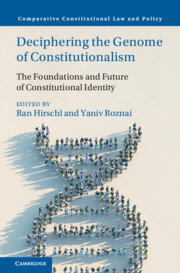Book contents
- Deciphering the Genome of Constitutionalism
- Comparative Constitutional Law and Policy
- Deciphering the Genome of Constitutionalism
- Copyright page
- Contents
- Figures
- Contributors
- Preface
- Acknowledgments
- Introduction
- Part I Foundations, Theory, and Concepts
- 1 Rousseau’s Sovereignty and the Concept of Constitutional Identity
- 2 Constitutional Identity
- 3 Constitutional Identity as Discourse
- 4 Constitutional Identity and Constitutional Revolution
- 5 The Death of Constituent Power
- 6 Constitutional Identity as a Source of Ontological Security
- 7 The Crisis in, and of, Constitutional Identity
- Part II Comparative Perspectives
- Part III American Constitutionalism and Constitutional Identity
- Part IV Emerging Trends
- Index
- References
5 - The Death of Constituent Power
from Part I - Foundations, Theory, and Concepts
Published online by Cambridge University Press: 14 March 2024
- Deciphering the Genome of Constitutionalism
- Comparative Constitutional Law and Policy
- Deciphering the Genome of Constitutionalism
- Copyright page
- Contents
- Figures
- Contributors
- Preface
- Acknowledgments
- Introduction
- Part I Foundations, Theory, and Concepts
- 1 Rousseau’s Sovereignty and the Concept of Constitutional Identity
- 2 Constitutional Identity
- 3 Constitutional Identity as Discourse
- 4 Constitutional Identity and Constitutional Revolution
- 5 The Death of Constituent Power
- 6 Constitutional Identity as a Source of Ontological Security
- 7 The Crisis in, and of, Constitutional Identity
- Part II Comparative Perspectives
- Part III American Constitutionalism and Constitutional Identity
- Part IV Emerging Trends
- Index
- References
Summary
Constitutional theory in democratic countries has traditionally postulated the existence of a sovereign people endowed with the authority to enact a constitution. An influential view going back to Sieyès claims that the constituent power of the people is legally unlimited. The ability of the people to enact a constitution is supposed to be fully disconnected from positive law. This notion, however, is seriously flawed. The idea that a legally omnipotent people, working its will at the constitutional stage, is the fountain of positive law makes no sense. Although the idea can be used rhetorically in some justificatory contexts to support valuable institutional arrangements, it also raises a number of pragmatic concerns. All things considered, our theoretical and political discussions would be more fruitful if we certified the death of that concept.
Keywords
- Type
- Chapter
- Information
- Deciphering the Genome of ConstitutionalismThe Foundations and Future of Constitutional Identity, pp. 63 - 75Publisher: Cambridge University PressPrint publication year: 2024

